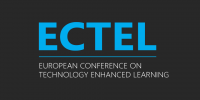
Eighteenth European Conference on Technology Enhanced Learning
Responsive and Sustainable Educational Futures
Aveiro, Portugal, 4-8 September 2023
Conference Theme
Responsive and Sustainable Educational Futures
This year’s conference builds on the theme of the last year’s conference and focuses on sustainable teaching and learning practices in the post-pandemic educational ecosystem. In the past few years, during the COVID-19 pandemic, many educational institutions were forced to adopt numerous educational technologies to continue serving their students. For many of these institutions, it was a novel practice, and they needed to adapt fastly by implementing different strategies, tools, services, and digital platforms to provide learning opportunities for a wide range of students.
As we are discovering a “new normal”, educational institutions can follow three trajectories when responding to learners’ and teachers’ needs in the post-pandemic world: a return to the status quo pre-pandemic, a short-term focus on remediating learning loss, or an organized effort to reinvent education to be more human-centered, responsive in addressing current needs of both teachers and students in a rapidly changing world, and responsible in providing education to all and protecting students’ privacy when using tracking technologies. We dedicate this year’s conference to exploring the third proposition and are calling for papers that can improve our understanding of how such an organized effort can be designed and implemented sustainably. We are looking for contributions addressing different educational technologies and pedagogies that support teachers and learners. Importantly, we welcome papers that address not only technologies that aim to enhance learning and teaching, but also examine organizational, social and responsible aspects of teaching and learning with technologies in post-pandemic educational settings.
We invite contributions for research papers, demonstrations, posters, and workshops. A doctoral consortium will be organised concurrently with the workshops.
Conference Topics
The topics of interest are grouped into the following eight blocks:
- Pedagogical and theoretical underpinning
- Educational Technologies
- Individual, social, and organisational learning processes
- Students’ skills and competences
- Supporting teacher professional development
- Ethics, privacy, regulations and policies
- Fairness, equity and equality
- Educational Technology in lifelong learning contexts
- Global teaching and learning
From both research and innovative practice perspectives the following topics of interest to the conference include, but are not limited to:
Pedagogical and theoretical underpinning
- Active learning
- Problem-and project-based learning
- Flipped classroom
- Competency-based education and training
- Inquiry-based, exploratory, and discovery learning
- Computer-supported collaborative learning and cooperative work
- Communities of learners and communities of practice
- Learning design and design approaches
- Teaching techniques and strategies for digital learning
- Game-based and simulation-based learning
- Storytelling and reflection-based learning
- Technology-enhanced orchestration of learning
- Learner well-being, affect, motivation, engagement, skills, attitudes, and value
Technological underpinning
- Mobile, wearable, and pervasive technologies
- Sensors, sensor networks, and Internet of Things
- Roomware, ambient displays, and ubiquitous devices
- Robots
- Remote and virtual labs
- Augmented reality, virtual reality, and mixed reality
- Serious games, simulations, and 3D virtual worlds
- Interactive, context-aware, personalised, and adaptive learning systems
- Visualisation techniques and dashboards
- Learning analytics
- Artificial intelligence
- Educational data mining and process mining
- Recommender systems
- Natural language processing and latent semantic analysis
- Semantic Web
- Social computing and social media
- Infrastructures and architectures
- Large-scale learning systems
- Specifications and standards
- Interoperability and sharing of devices, tools, architectures, and data
Individual, social & organisational learning processes
- Cognitive and metacognitive mechanisms in knowledge acquisition and construction
- Self-regulated and self-directed learning
- Reflective learning
- Strategies for the development of 21st century skills
- Computational thinking
- Social processes in teams and communities
- Bring your own device (BYOD)
- Group and collaborative work
- Assessment of/for/as learning (formative, summative, self-, peer- assessment)
- Social awareness
- Sensemaking and Meaning Making
- Knowledge management and organisational learning
- Collaborative knowledge building
Ethics, privacy, regulations and policies
- Ethics and privacy for data gathering, storage, processing, and presentation
- Data privacy
- Regulations and policies related to educational data
- Strategies to handle ethics and privacy for handling educational data
Learning communities and contexts
- Formal education: K-12
- Formal education: higher education
- Lifelong learning
- Informal and non-formal learning
- Interprofessional and Interdisciplinary Learning
- Vocational education and training
- Seamless learning
- Teacher education and professionalization
- Tutoring and student support
Global teaching and learning
- Global challenges
- Massive Open Online Courses (MOOC)
- Smart Learning Environments (SLEs)
- Open educational resources (OER)
- Learning Networks
- Teacher Networks
- Learning ecologies, learning ecosystems, fitness and evolvability of learning environments
- Business models
- Micro-credentials
Quality education for underrepresented groups
- Fairness, equity, and equality
- Digital and generation divide and learning
- Teaching and learning in rural and isolated areas
- Inclusive, equitable, and accessible learning
- Standards about accessibility and learning
- Promotion of learning and employability within underrepresented groups and communities
- Learning of students of underrepresented groups, including students with special needs
- Psycho-pedagogical support for users